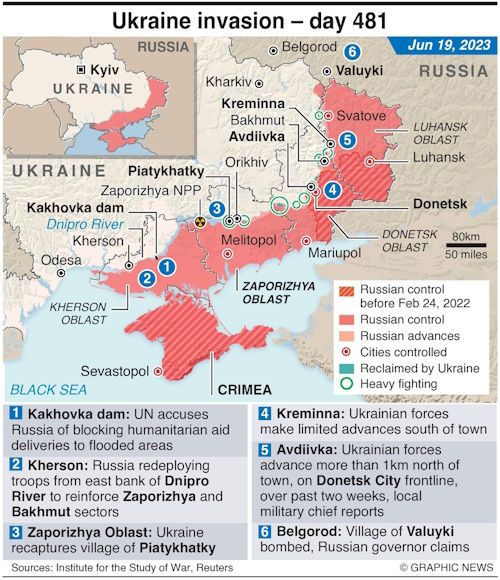If you are tired of war fatigue, brace yourself for more war. Eighteen more months of conflict, to be precise.
No one knows if our prediction is accurate, but the truth is that even people in the Biden administration don't have a clue. Every war to date in which the United States has been involved has had a specific objective, many times, breached because of scope creep. But the goal has always been established, often with a vote in Congress to secure funding. The idea is to get the American people behind the war effort.
President Biden has cleverly avoided identifying a defined objective other than to have his senior cabinet officials talk in broad terms. Speaking at the U.N. Security Council, Secretary Antony Blinken said: "We cannot – we will not – allow President Putin to get away with it. Defending Ukraine's sovereignty and territorial integrity is about much more than standing up for one nation's right to choose its own path, fundamental as that right is. It's also about protecting an international order where no nation can redraw the borders of another by force."
The above declaration does nothing to clarify when the war will end. If anything, President Biden frequently says that America will support Ukraine for "as long as it takes." So, we have a war for which Congress has never voted (other than to provide emergency funds), the objective of which has been outsourced to a foreign leader, and the timeline is entirely open-ended. If anyone needs proof that President Biden is an irresponsible steward of taxpayer funds, this is it.
How can we predict that the war will continue through Jan 2025? For the Biden administration, it is all politics all the time.
The worst move Biden could make is to end the war before the 2024 election. If he did, he would open himself to negative news stories about what the war accomplished - short of a complete rout of the Russian army and Ukraine returning to the pre-2014 borders before Russia took Crimea. President Zelenskyy has trapped himself into a corner by repeatedly stating this as his objective when the world knows Russia would never compromise here. If Zelenskyy threatens Crimea, Putin is more likely to deploy nuclear weapons, as Putin has repeatedly stated that he would not hesitate to defend any existential threats to Russia. The world would never support an escalation of that kind.
Biden will also take flak from Republicans on the campaign trail, who will insist that Biden has ruined America's standing in the world by committing the United States to another failed effort (Afghanistan, Vietnam). Biden's main selling point is that he championed America's return to lead the international world order - a point that he can't make if the war ended before the election and Ukraine did not accomplish total victory.
So, the war will go on past November 2024.
If either Trump or DeSantis wins the election, the war funding will stop on the first day of their presidency in 2025. Both candidates have been cynical about America's involvement from the start. History is behind them too. In Vietnam (Nixon), Iraq (Obama), and Afghanistan (Biden), it took a president from the opposing party to stop a war. While "bringing the troops home" is a rallying cry and does not apply to Ukraine, not funding an endless war can be an equally potent political point.
The GOP winner also reads tea leaves and knows that angling for peace will elevate their stature worldwide.
Turkish president Erdoğan resoundingly won reelection in a runoff, much to the ire of the entire Western coalition. Erdoğan, who helped engineer the Black Sea grain deal with Ukraine and Russia, has championed peace and ending hostilities since the conflict started.
Last week, an African delegation of leaders from South Africa, Egypt, Senegal, Congo-Brazzaville, Comoros, Zambia, and Uganda visited Moscow to argue for a 10-point peace deal.
India's Prime Minister Narendra Modi is being wined and dined at a state visit in Washington, including being offered a chance to address a joint session of Congress. Modi, a clever politician facing reelection challenges back home after his party faced a rout in a recent state election, is unlikely to budge from his neutral stance in arguing for peace, a stance that has given hungry Indian motorists affordable Russian oil at huge discounts.
China, too, has argued for peace, and the GOP winner's move would be opening for Beijing to begin normalizing a challenging relationship.
If President Biden wins reelection - and depending upon how close the results are - he could either double down, arguing that he received a mandate for more war, or seek a peace deal given that Washington will have to assume the lion's share of any reconstruction. We predict the latter, as he can use the elections as a pivot to change direction to build bi-partisan support in Congress. Second-term presidents are always thinking about their legacy, and Biden would rather be remembered for peace than for a war that goes on forever.
Until Jan 2025, however, expect the needless and senseless war to continue.
Related Infographic

Please email editor-tippinsights@technometrica.com
Like our insights? Show your support by becoming a paid subscriber!









